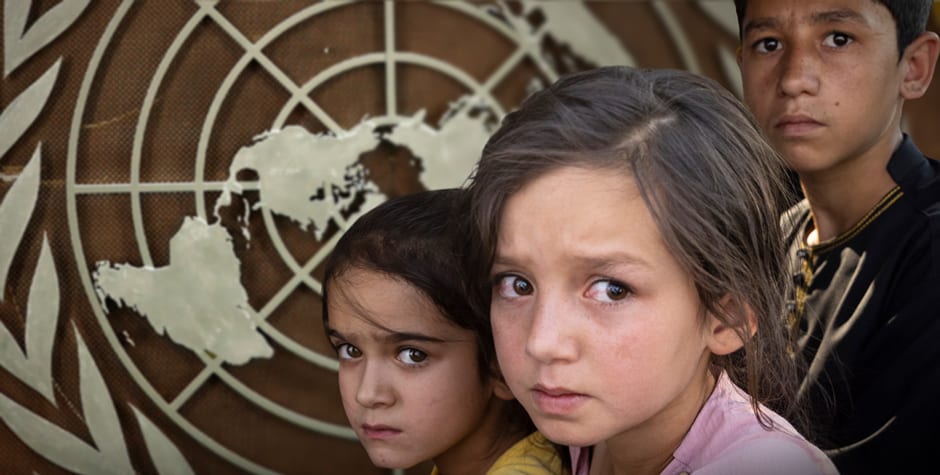ACLJ Files Six Reports at the UN Defending Persecuted Christians Around the World
Listen tothis article
We just filed 14 reports at the U.N. for the 50th session of the Universal Periodic Review (UPR), highlighting a host of human rights violations such as religious persecution, abortion, human trafficking, etc. The UPR is an important process that allows us to document human rights violations in every U.N. Member State about every four years. For the 50th session of the UPR, we discussed religious persecution in six of the countries: Mongolia, Maldives, Libya, Honduras, Belarus, and the United States of America.
In Mongolia, religious groups are arbitrarily denied legal status. As we highlighted in our report, one religious group was denied because they were told there were too many churches. It is dangerous for Christians to discuss their faith as it is viewed as proselytizing, which is effectively prohibited under Mongolian law. One priest shared:
We now run schools and orphanages. In these places, we are still not allowed to put religious objects like crosses or images of Jesus. The worst is that our religious sisters are not allowed to wear their habits. The authorities from time to time come to check our schools and orphanages, even asking our orphans if we talk about Jesus with them.
In Maldives, citizenship is restricted only to Muslims, meaning that if a Maldivian converts to Christianity and their new faith is uncovered, they risk losing their citizenship. Further, women who have converted to Christianity are subjected to physical and sexual abuse and have been forced to marry Muslim men.
In Libya, Christians have been arrested for peacefully sharing their faith with others. In our report, we shared numerous examples of Christians being arrested for sharing their faith in public, which is punishable by death. Here is one of the many stories we highlighted in our report:
In Spring 2023, a Pakistani Christian was arrested alongside six Libyans and two Americans. According to our source, the individuals were charged with proselytizing and belonging to an organized Christian cell. The two Americans were released shortly after being detained as a result of the United States government’s intervening. The six Libyans were charged with violating Article 207 of the Penal Code. If convicted, they would face the death penalty.
In Honduras, criminal gangs view Christianity as a threat to their criminal activities. Christian leaders who speak out against these gangs can find themselves being a target and are subjected to violent attacks. For example, on September 14, 2024, a pastoral worker was shot and killed by two masked men. He was killed just hours after a press conference in which he denounced corruption and organized crime. In another incident in May 2023, a Christian pastor was killed as he was leaving church. Unfortunately, these are just two of the many stories we highlighted in our report.
In Belarus, the government uses legal barriers to restrict religious freedom. In order for religious groups to carry out religious activities, they must register with the government. To make things more difficult, the government passed a new law requiring all religious groups to reregister within one year. In one story we highlighted, a Christian leader was fined for simply holding religious meetings at his home because it was considered an unregistered church. In another case, a Christian pastor was sentenced to prison for baptizing people in his backyard pool without government permission.
While we do not face the kinds of persecution for our faith here in the United States that is present in many other areas of the world, we did highlight some egregious examples of religious discrimination faced in our own country. For our report for the United States, we were able to tell the stories of people who have been denied community rooms to hold Bible studies and those who have been denied religious exemptions from their employers. We highlighted the case of a Christian pastor who was denied by his local library the use of a community room for Bible studies and gatherings for grief support. We also shared the story of a Transportation Security Administration (TSA) employee who had been denied a religious exemption to attend church. Additionally, we expressed our concern over the previous Administration’s use of the FBI to target Christians who purchased religious texts and to label Catholics who attend the traditional Latin Mass as “extremists.”
Freedom of religion is a fundamental human right that is enshrined in human rights documents such as the Universal Declaration of Human Rights (UDHR) and the International Covenant on Civil and Political Rights (ICCPR). Article 18 of the UDHR enshrines the right for everyone to have “freedom of thought, conscience and religion,” and “this right includes freedom to change his religion or belief, and freedom, either alone or in community with others and in public or private, to manifest his religion or belief in teaching, practice, worship and observance.” This right must be protected by every country.
At the ACLJ, we will continue to highlight religious persecution around the world and give a voice to those who are persecuted. No individual should be harassed, attacked, arrested, or killed because of their faith.

